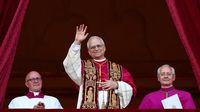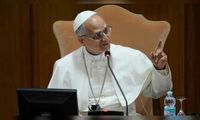Pope Leo XIV has made headlines by revealing that artificial intelligence (AI) played a significant role in his choice of papal name. The newly elected leader of the global Catholic Church, Robert Francis Prevost, took on the name Leo XIV during his election on May 9, 2025, and emphasized the relevance of AI in his inaugural address to the College of Cardinals two days later.
In his first formal address, Pope Leo XIV linked his name choice to the legacy of Pope Leo XIII, who served from 1878 to 1903 and famously addressed the social questions of his time in his encyclical, Rerum Novarum. He stated, “I chose to take the name Leo XIV... mainly because Pope Leo XIII in his historic Encyclical Rerum Novarum addressed the social question in the context of the first great industrial revolution.”
Prevost, who is 69 years old and hails from Chicago, highlighted the parallels between the industrial revolution of the 19th century and the current technological upheaval driven by AI. He noted that the Church must confront the ethical challenges posed by this new era while defending human dignity, justice, and labor. “In our own day, the Church offers to everyone the treasury of her social teaching in response to another industrial revolution and to developments in the field of artificial intelligence that pose new challenges for the defence of human dignity, justice and labour,” he added.
His remarks come at a time when AI's influence is increasingly being scrutinized. Just days before his election, former U.S. President Donald Trump shared an AI-generated image of himself dressed as the pontiff, humorously commenting on the role AI plays in shaping perceptions. This incident, along with the ongoing discussions about AI's implications, underscores the growing intersection of technology and faith.
Pope Leo XIV’s comments echo those of his predecessor, Pope Francis, who frequently addressed the promises and perils associated with AI. In 2023, Pope Francis became a target of AI-driven deception when a fabricated image of him in a white designer puffer jacket went viral. The following year, he cautioned against manipulated visuals that can appear “perfectly plausible but false.” Furthermore, at the G7 summit in 2024, he advocated for an international agreement on “algor-ethics,” emphasizing the need for moral frameworks to guide AI technologies.
During his address, Pope Leo XIV reiterated his commitment to the principles laid out by Pope Francis, which include a focus on the marginalized and a more inclusive Church. He stated, “Let us treasure this precious legacy and resume our journey, animated by the same hope that comes from faith.” This commitment aligns with the reforms of the Second Vatican Council, which aimed to modernize the Church in the 1960s.
The new pope’s approach reflects a broader concern within the Catholic Church regarding the implications of AI. A document released by the Vatican in January 2025 examined AI's constraints and its connection to truth, highlighting the moral considerations surrounding its use. Pope Leo XIV’s acknowledgment of AI as a challenge to human dignity indicates the Church’s ongoing engagement with contemporary issues.
As the first American pope, Leo XIV's election marks a significant moment in the Church's history. His selection was notably swift, occurring on the fourth ballot of the conclave, which was the largest and most geographically diverse in history. Cardinal Désiré Tsarahazana of Madagascar revealed that Prevost received “more” than 100 votes on the final ballot, far exceeding the two-thirds majority required for election.
In his remarks, Pope Leo XIV also reflected on his namesake’s contributions to modern Catholic social thought, particularly through Rerum Novarum, which addressed workers’ rights amid the industrial upheaval of his time. He emphasized the need for the Church to respond to similar challenges posed by AI today.
As the new pontiff, Leo XIV faces the daunting task of navigating the complexities of modern technology while remaining true to the Church’s mission. He expressed a commitment to continuing the work of his predecessor, focusing on the ethical implications of AI and ensuring that the Church remains a voice for justice and dignity in an increasingly digital world.
In conclusion, Pope Leo XIV’s election and his reflections on AI signal a pivotal moment for the Catholic Church as it grapples with the moral dilemmas of the digital age. His commitment to addressing these challenges head-on may shape the Church's direction in the years to come, as it seeks to uphold the values of human dignity and social justice in a rapidly changing landscape.





